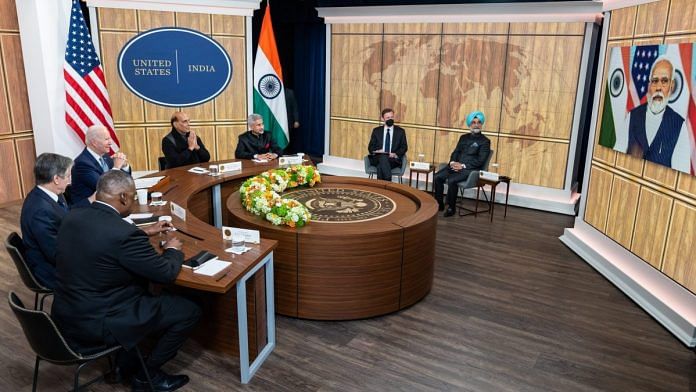Prime Minister Narendra Modi and United States President Joe Biden spoke virtually on Monday, hours before the foreign and defence ministers of India and the US began their 2+2 dialogue, and India’s support for Russia’s war in Ukraine seems to have figured in both conversations.
Biden is clearly applying the pressure but doesn’t want to be seen crossing a line in telling India what to do and what not to do — his economic czars, Brian Deese and Daleep Singh have already, publicly, delivered that message.
But Biden needn’t worry too much. United Kingdom Prime Minister Boris Johnson is coming to India in the next fortnight or so and the Russian invasion will come up. Soon after, the European Commission president Ursula von der Leyen is likely to come to Delhi as chief guest of the Raisina Dialogues, a hugely successful event masterminded by the Observer Research Foundation think-tank in collaboration with the Ministry of External Affairs.
With so many Western leaders in town, PM Modi will be called upon to explain India’s position on the Russia-Ukraine war. The Americans are pointing out that India needs to diversify its arms dependence on Russia sooner than later, and that Russian defence equipment hasn’t quite won the war in Ukraine, which is in its 48th day.
The million-rupee question is, how far and in what direction will Modi tilt in pursuit of India’s national interest?
As always, the context is significant. Food riots are breaking out in Shanghai, China’s largest city, because the authorities have shut it down to control Covid-19. Is this, then, the first sign of weakness on the part of the Communist Party? Can Covid undermine the social compact between the Chinese people and the CCP, in which the party has taken care of all the material needs of the people as well as the promise not to allow social unrest these last few decades in exchange for total power?
The world will carefully watch how China deals with Covid. Any sign of weakness will have a cascading impact on its influence globally, not least in South Asia where people’s movements are unsettling elected governments. Imran Khan’s exit from the Pakistan government and the return of Nawaz Sharif’s party, the Pakistan Muslim League (N), with his brother Shehbaz Sharif likely to become the new prime minister and expected to stabilise the relationship with India. Normalisation, however, will take time.
As for Sri Lanka, protests against President Gotabaya Rajapaksa are continuing. Reports say India is keenly aware that any emergency aid should be seen as being directed towards the people, not towards the Rajapaksa brothers, who have sought to tightly control the island nation’s politics since prime minister Mahinda Rajapaksa led the war against the Liberation Tigers of Tamil Eelam (LTTE) in 2009. Some of their power has been funded by huge Chinese investments in Sri Lanka.
Also read: India, US know they need each other – after Russia war, China will be back front and centre
Pakistan govt gone, Lanka’s hanging by thread
The change in government in Pakistan isn’t about to affect a shift in its affection for Beijing; the Sharifs will be as dependent on the Chinese as Imran Khan was. But if the Sharifs win the coming election – Shehbaz will become prime minister and his nephew, Hamza, will become chief minister of Punjab province – then a less antagonistic relationship with India could reap wonders.
What is interesting here is that the Pakistan military has squarely come out in favour of improving ties with the US – Imran Khan’s conspiracy theories of America trying to overthrow his government were given short shrift by none other than Pakistan Army chief General Qamar Javed Bajwa a few days before Khan lost the vote of no confidence in Parliament.
The world recognises that history has been made in Pakistan this weekend with a civilian prime minister being voted out on the floor of the House. It has never happened before in Pakistan’s 75-year history.
While there is much talk about the Army chief and Inter-Services Intelligence (ISI) chief warning Imran Khan not to try and dismiss them in favour of his own hand-picked generals – and how the Army’s withdrawal of its blessings from the Pakistan Tehreek-e-Insaf (PTI) government indicates that it remains the final arbiter of power – the fact remains that Pakistan’s united Opposition, and especially its media, steadily maintained the pressure on Imran Khan all through the week in order to demonstrate that the former PM was bent upon destroying every institution in order to save his chair… and skin.
The Pakistani media, especially, must be congratulated for refusing to give in even when it was being roundly castigated by the authorities. But they focused on the goal, which was to uphold the Constitution – nothing less. A lesser cohort would have capitulated. Imran Khan had to go.
And while the Sri Lanka crisis hasn’t reached a crescendo, like in Pakistan, it is clear that the Rajapaksas are on the mat and that they are losing favour with the masses. What is less clear is whether the Chinese loss of influence in Sri Lanka is directly proportional to the growing strength of the street protests.
Certainly, the US, like India, is carefully watching which way the wind blows in South Asia. The Americans recognise that India needs some reaffirmation about its role in the Quad, which could in turn help moderate Delhi’s position on the Russia conflict.
According to The Economist, China sees Russia as a partner in dismantling the liberal world order which the alliance can exploit the war in Ukraine to hasten the Western decline.
But the big question remains, for other Quad countries: Which side is India on? It’s a question Biden would have surely asked Modi. India’s actions in the coming weeks will reveal its cards.
Jyoti Malhotra is a senior consulting editor at ThePrint. She tweets @jomalhotra. Views are personal.
(Edited by Srinjoy Dey)



